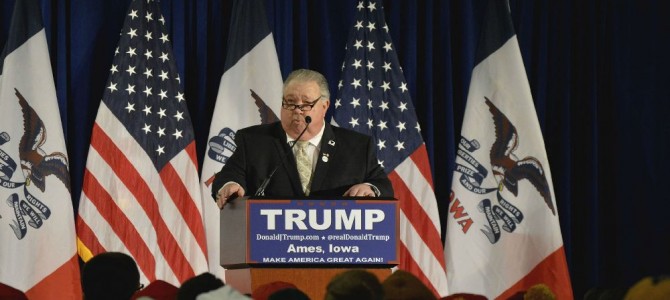
During the Republican National Convention last week, Republican presidential nominee Donald Trump once again proved why he is unfit to be a world leader. In an interview with The New York Times before he accepted the nomination, Trump told reporters he wouldn’t necessarily come to the aid of North Atlantic Treaty Organization (NATO) allies who were being attacked, specifically referencing those in Eastern Europe. He said it would depend on whether they were financially holding up their part of the bargain.
The man who has a fair chance of being our next president casually dropped in an interview that he would violate a treaty the United States has upheld since NATO’s founding in 1949. This kind of unpredictability on the international stage is the most dangerous aspect of a possible Trump presidency.
This isn’t the first time Trump has indicated his reluctance to cooperate with other countries and maintain America’s foreign policy status quo. He’s spoken openly about allowing other countries to procure nuclear weapons, and has taken a stance on international relations and U.S. involvement strikingly similar to the Obama doctrine of leading from behind, although Trump’s preferred tagline is “America first.”
Aren’t We Done with Rookies?
Trump’s latest foray into foreign policy has left many aghast at such a reckless statement by a presidential candidate. But the Republican establishment rushed to Trump’s defense, as they have repeatedly throughout the campaign season. Senate Majority Leader Mitch McConnell chalked the NATO comments up to a “rookie mistake,” an excuse that, if true, is hardly comforting.
We’ve done the rookie thing before. We’ve had eight years of that. Even more disconcerting than having a novice in the White House, however, is Trump’s erratic behavior, which sends wildly unpredictable signals to both our allies and enemies. When he says we might not defend our NATO allies, it creates instability and chaos, especially since no one is sure how seriously to take Trump’s pronouncements.
It frightens our allies, causing them to look elsewhere for aid, and strengthens aggressors like Russia and Iran, who look for weakness and uncertainty. The problem in both cases is that Trump’s stream-of-consciousness policy creation could cause other countries to take premature or unnecessary action. Is he firing warning shots as part of a negotiating tactic (perhaps giving him more credit than he deserves)? Is he totally unserious and just spit-balling? Or does he mean what he says?
The problem is that other countries won’t be able to make a good read on his plans. A lot of diplomacy and politics is about sending signals to other countries, to policymakers and business investors alike. But Trump’s signals are scrambled and impossible to decipher. It’s like playing poker with an amateur.
You can interpret a good poker player’s decisions to call, raise, or check, and in turn make a decision yourself. With a new or bad player, there’s nothing to read, because the player doesn’t know what he’s communicating with each move. He may outbid you because he thinks he’s got a full house, but it turns out he’s only got two pairs. How do you gauge your play with that kind of misinformation?
Trump’s Advisers Aren’t Helping, Either
Trump’s drive-by approach to policy is to speak first and formulate policy later. But we are repeatedly assured that although he may say off-the-cuff and unprecedented things about changing libel laws or abandoning our allies, he’s surrounded by “top men” who are taking a more serious look at domestic and foreign policy, men to whom Trump will listen.
So far that theory isn’t holding up. Last week, the International Republican Institute gathered European diplomats and security experts to discuss U.S.-European relations. Included on the panel was Trump’s top policy advisor, Sam Clovis, an economics professor at Morningside College and former Air Force colonel, who was the focus of several questions regarding Trump’s NATO comments. Much like his boss, Clovis was irritable and unable to respond cogently to questions about the campaign’s foreign policy platform.
After trying to dodge a question, Clovis ended up repeating lines about “burden sharing” and everyone pulling his own weight, indicating our willingness to help our allies comes with new conditions. When The Washington Post’s Josh Rogin pointedly asked whether Trump is just negotiating or really means what he says, Clovis told the audience to “read Trump’s books,” adding that the number-one priority is tax reform, and “if you’re gonna come to a gun fight, make sure you bring a gun.”
When Rogin asked for more clarification, Trump’s advisor said “no one” else has thought about the financial and blood consequences of our NATO treaty—an untrue and arrogant statement. He added that Trump isn’t interested in getting involved in anything abroad until he is pretty sure what the outcome will be, setting an unrealistic standard for making foreign policy decisions.
Clovis’ own message was as unclear as Trump’s, further evidence the Trump campaign is in a constant scramble to explain their boss’s loose-lipped comments. It’s also a sign that his “top advisors” have little to no crisis management skills, something they’re going to need more of as the general election heats up. Clovis in particular casts doubt on the theory that Trump is surrounded by the best policy advisors.
Trump’s verbal stylings also seem to extend to his advisors. Clovis closed his remarks by saying the whole idea of the campaign’s approach to NATO is “don’t write checks your butt can’t cash.” At the same time, he insisted “We’re offering a clear, mature, adult, realistic vision of the world.” If we’re meant to be comforted by the advisors with whom Trump is surrounding himself, it’s not working.
Whatever their vision of the world, the Trump campaign is sending a confused message to the American people, and, more importantly, to the international community. What comes out of that confusion could be disastrous for our allies, and ourselves.









